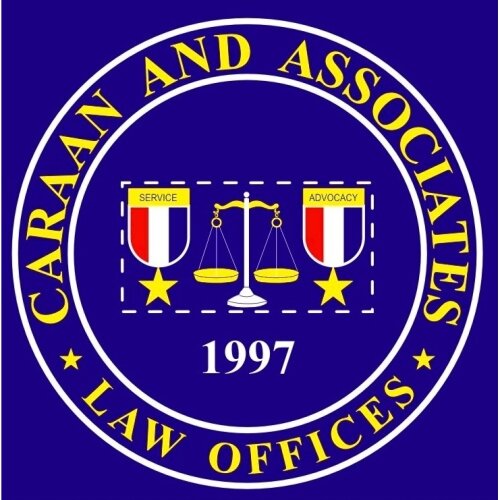Best Administrative Lawyers in Manila
Share your needs with us, get contacted by law firms.
Free. Takes 2 min.
List of the best lawyers in Manila, Philippines
About Administrative Law in Manila, Philippines
Administrative law in Manila, Philippines, is a branch of public law that regulates the actions and operations of government agencies. It involves the oversight of government officials' compliance with legal and regulatory frameworks. The focus in administrative law is ensuring transparency, accountability, and fairness in governmental operations. In Manila, this body of law helps safeguard the rights of citizens interacting with various government bodies, ensuring lawful delegation of power and appropriate use of administrative discretion.
Why You May Need a Lawyer
There are several scenarios where individuals or businesses might require legal assistance in the field of administrative law. Some common situations include:
- Disputes regarding government contracts or permits.
- Issues related to regulatory compliance or government audits.
- Challenges to administrative decisions affecting businesses or property rights.
- Pursuing claims about unlawful administrative actions.
- Representing a client before administrative tribunals or boards.
- Interacting with government agencies for business registration and licensing.
- Defense against disciplinary actions imposed by regulatory bodies.
- Assisting in the navigation of complex regulatory and administrative procedures.
Local Laws Overview
Administrative law in Manila is shaped by several key legal frameworks and statutes. These legal instruments include:
- The Administrative Code of the Philippines, which consolidates the rules and regulations for government bureaucracy.
- The Local Government Code, establishing the administrative duties and powers of local government units (LGUs) in Manila.
- The Republic Act No. 9485, or the Anti-Red Tape Act, aiming to improve government service delivery by combating bureaucratic red tape.
- Various sector-specific regulations influencing areas like public utilities, environmental management, and education.
Frequently Asked Questions
What is administrative law?
Administrative law involves the powers, procedures, and actions of government administrative agencies, ensuring they comply with the law, protect public interest, and provide fair processes.
How does administrative law affect businesses in Manila?
Administrative law affects businesses by regulating their interactions with government agencies. Compliance with regulations, obtaining licenses, and addressing disputes with governmental authorities are common applications.
What should I do if I disagree with a government agency's decision?
If you disagree with a decision made by a government agency, you may file an appeal or a motion for reconsideration with the agency. Consulting with an administrative lawyer can guide you through the appropriate procedures.
Can administrative decisions be challenged in court?
Yes, administrative decisions can be reviewed and challenged in court through formal processes such as judicial review, to ensure compliance with legal standards.
How can a lawyer help with government contracts?
An administrative lawyer can assist with reviewing, negotiating, and ensuring compliance with the terms of government contracts to protect your interests and help resolve any disputes.
What are some challenges to expect during a government audit?
Challenges may include ensuring the completeness and accuracy of documentation, interpreting compliance requirements, and responding to potential findings or penalties. Legal guidance can ease these processes.
What steps should I take before interacting with a governmental agency?
It's advisable to understand the relevant regulations, prepare necessary documentation, and possibly consult with a legal expert to ensure compliance and effective communication.
How do local ordinances impact administrative procedures?
Local ordinances can establish specific administrative regulations and requirements, which must be adhered to alongside national laws, particularly when operating within the jurisdiction of Manila’s local government units.
What is the role of the Civil Service Commission in administrative law?
The Civil Service Commission oversees the professionalism, integrity, and efficiency of public servants, ensuring administrative decisions adhere to established standards and legal requirements.
Are there time limits for filing administrative appeals?
Yes, there are specific time limits for filing appeals or petitions in administrative cases. These can vary based on the context and agency involved, highlighting the importance of timely legal advice.
Additional Resources
For further assistance, consider reaching out to the following resources and organizations:
- The Integrated Bar of the Philippines for lawyer referrals.
- The Office of the Ombudsman for issues of administrative justice and integrity in public service.
- The Civil Service Commission for government employee-related concerns.
- The Department of Justice for general legal guidance and resources.
- Local government units in Manila for regulations and permits specific to the city.
Next Steps
If you need legal assistance in administrative matters in Manila, consider taking the following steps:
- Identify the specific administrative issue you are facing and gather any relevant documentation.
- Seek out qualified legal professionals specializing in administrative law for consultation.
- Prepare a timeline and outline any communications, decisions, or actions taken to date.
- Follow procedural guidelines and timelines for any actions, appeals, or filings required.
- Stay informed of any legislative or regulatory changes that might affect your case.
Lawzana helps you find the best lawyers and law firms in Manila through a curated and pre-screened list of qualified legal professionals. Our platform offers rankings and detailed profiles of attorneys and law firms, allowing you to compare based on practice areas, including Administrative, experience, and client feedback.
Each profile includes a description of the firm's areas of practice, client reviews, team members and partners, year of establishment, spoken languages, office locations, contact information, social media presence, and any published articles or resources. Most firms on our platform speak English and are experienced in both local and international legal matters.
Get a quote from top-rated law firms in Manila, Philippines — quickly, securely, and without unnecessary hassle.
Disclaimer:
The information provided on this page is for general informational purposes only and does not constitute legal advice. While we strive to ensure the accuracy and relevance of the content, legal information may change over time, and interpretations of the law can vary. You should always consult with a qualified legal professional for advice specific to your situation.
We disclaim all liability for actions taken or not taken based on the content of this page. If you believe any information is incorrect or outdated, please contact us, and we will review and update it where appropriate.

















